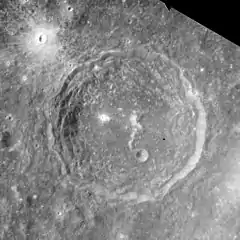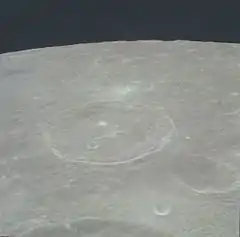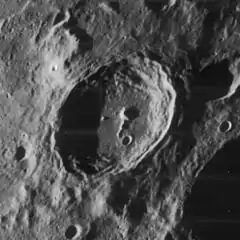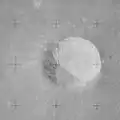 Apollo 15 Mapping Camera image | |
| Coordinates | 10°40′S 76°17′E / 10.67°S 76.28°E |
|---|---|
| Diameter | 80.40 km |
| Depth | 4.78 km[1] |
| Colongitude | 285° at sunrise |
| Eponym | Jean-François de La Pérouse |


La Pérouse is a lunar impact crater that is located near the eastern limb of the Moon. It lies northwest of the larger crater Ansgarius, and to the east of Kapteyn. This crater appears foreshortened due to its location, but the rim is nearly circular when viewed from orbit.
The rim of La Pérouse is not significantly worn by subsequent impacts, and its features are well-defined. Terraces line much of the inner wall, and there is a small outer rampart. There are also small outward bulges in the rim to the south-southeast and south-southwest. Within the interior floor is a central ridge offset to the northeast of the midpoint, and this formation is somewhat elongated to the southeast. There is a small crater (La Pérouse D) in the southeastern part of the floor.
The crater's name was approved by the IAU in 1935.[2] The name is sometimes spelled 'La Peyrouse'.
Satellite craters
By convention these features are identified on lunar maps by placing the letter on the side of the crater midpoint that is closest to La Pérouse.
| La Pérouse | Latitude | Longitude | Diameter |
|---|---|---|---|
| A | 9.3° S | 74.7° E | 4 km |
| D | 11.2° S | 76.6° E | 7 km |
| E | 10.2° S | 78.5° E | 34 km |
The small but bright La Pérouse A is surrounded by a ray system (higher albedo ejecta). D lies at the south tip of the central peak, and E is a subdued crater to the east.
References
- ↑ Lunar Topographic Orthophotomap (LTO) Series, LTO-81D2, La Perouse. Defense Mapping Agency. Scale: 1:250,000.
- ↑ La Pérouse, Gazetteer of Planetary Nomenclature, International Astronomical Union (IAU) Working Group for Planetary System Nomenclature (WGPSN)
- Wood, Chuck (October 11, 2006). "A Previously Unimaged Crater". Lunar Photo of the Day. Retrieved 2006-10-11.
- Wood, Chuck (May 10, 2007). "A Sparkling Diamond". Lunar Photo of the Day. Retrieved 2007-05-10.
- Andersson, L. E.; Whitaker, E. A. (1982). NASA Catalogue of Lunar Nomenclature. NASA RP-1097.
- Blue, Jennifer (July 25, 2007). "Gazetteer of Planetary Nomenclature". USGS. Retrieved 2007-08-05.
- Bussey, B.; Spudis, P. (2004). The Clementine Atlas of the Moon. New York: Cambridge University Press. ISBN 978-0-521-81528-4.
- Cocks, Elijah E.; Cocks, Josiah C. (1995). Who's Who on the Moon: A Biographical Dictionary of Lunar Nomenclature. Tudor Publishers. ISBN 978-0-936389-27-1.
- McDowell, Jonathan (July 15, 2007). "Lunar Nomenclature". Jonathan's Space Report. Retrieved 2007-10-24.
- Menzel, D. H.; Minnaert, M.; Levin, B.; Dollfus, A.; Bell, B. (1971). "Report on Lunar Nomenclature by the Working Group of Commission 17 of the IAU". Space Science Reviews. 12 (2): 136–186. Bibcode:1971SSRv...12..136M. doi:10.1007/BF00171763. S2CID 122125855.
- Moore, Patrick (2001). On the Moon. Sterling Publishing Co. ISBN 978-0-304-35469-6.
- Price, Fred W. (1988). The Moon Observer's Handbook. Cambridge University Press. ISBN 978-0-521-33500-3.
- Rükl, Antonín (1990). Atlas of the Moon. Kalmbach Books. ISBN 978-0-913135-17-4.
- Webb, Rev. T. W. (1962). Celestial Objects for Common Telescopes (6th revised ed.). Dover. ISBN 978-0-486-20917-3.
- Whitaker, Ewen A. (1999). Mapping and Naming the Moon. Cambridge University Press. ISBN 978-0-521-62248-6.
- Wlasuk, Peter T. (2000). Observing the Moon. Springer. ISBN 978-1-85233-193-1.

